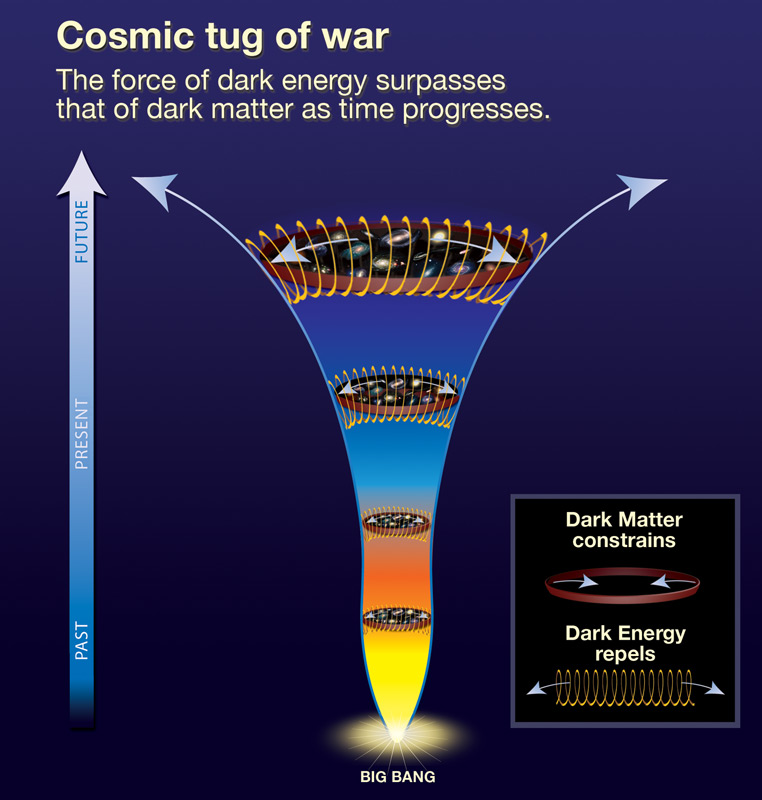Dark energy is a mysterious force believed to be responsible for the accelerating expansion of the universe, raising profound questions about its very nature. Recent findings from the Dark Energy Spectroscopic Instrument (DESI) collaboration reveal that dark energy’s effects may be evolving, suggesting that the cosmological constant we once thought was unchanging may actually be weakening over time. This groundbreaking research, which draws upon the largest three-dimensional map of our cosmos ever created, examines the intricate relationship between dark energy and matter across an expansive timeline of 11 billion years. By investigating subtle patterns known as Baryon Acoustic Oscillations, scientists can measure how dark energy influences the universe’s expansion. As we delve deeper into these revelations, we may need to revisit our fundamental understanding of cosmic dynamics and the role of dark energy in shaping the future of our universe.
The concept of dark energy, often associated with terms like cosmic acceleration and the cosmological constant, poses intriguing challenges for astrophysicists. As researchers from the DESI collaboration explore this enigmatic force, they uncover its implications not only on the universe’s expansion but also on the distribution and behavior of matter. Patterns such as Baryon Acoustic Oscillations serve as invaluable tools for measuring the weight of dark energy over time, providing insights into how the universe’s fate unfolds. The evolving nature of this force indicates that our comprehension of cosmic phenomena must adapt to new discoveries, reshaping the foundational paradigms we use to interpret the universe’s evolution.
Understanding Dark Energy: The Force Behind Universe Expansion
Dark energy is a mysterious phenomenon that accounts for approximately 68% of the total energy density of the universe. It plays a critical role in the accelerated expansion of the universe, a concept that has reshaped our understanding of cosmic forces. Initially considered a cosmological constant, dark energy’s nature is still not fully understood, and new findings from the Dark Energy Spectroscopic Instrument (DESI) collaboration suggest it might be evolving over time. This raises intriguing questions about the fundamental laws governing our universe and whether current models adequately explain the observed expansion.
The DESI collaboration has been pivotal in examining the effects of dark energy over an extensive timeline, utilizing data collected from the largest 3D map of the universe. By investigating the distribution of galaxies and quasars, researchers are piecing together evidence regarding dark energy’s influence on cosmic expansion. This analysis, stretching back 11 billion years, suggests that the characteristics of dark energy can provide vital insights into how the universe’s fate may unfold in the coming eons.
Frequently Asked Questions
What is dark energy and how does it affect the universe expansion?
Dark energy is a mysterious form of energy thought to be responsible for the accelerating expansion of the universe. It constitutes approximately 68% of the universe and is often associated with the cosmological constant. The effects of dark energy influence the rate at which galaxies move away from each other, suggesting that the universe’s expansion is not only ongoing but potentially increasing over time.
How does the DESI collaboration study dark energy effects on cosmic expansion?
The Dark Energy Spectroscopic Instrument (DESI) collaboration studies dark energy by creating the largest 3D map of the universe to track the distribution of matter over time. By analyzing data from over 14 million galaxies and quasars, DESI examines dark energy’s effects and provides insights into how it may be evolving, thus impacting our understanding of cosmic expansion.
What are Baryon Acoustic Oscillations and their role in measuring dark energy?
Baryon Acoustic Oscillations (BAOs) are regular, periodic fluctuations in the density of visible baryonic matter, caused by sound waves in the early universe. These patterns serve as reliable ‘standard rulers’ to measure distances in the universe. By observing BAOs, researchers can gauge the expansion rate of the universe and the strength of dark energy throughout different epochs in cosmic history.
What implications do recent findings on the cosmological constant have for dark energy?
Recent findings suggest that the cosmological constant, often equated with dark energy, might not be a constant after all. Research from the DESI collaboration indicates that dark energy may be weakening over time, prompting scientists to reconsider current models of cosmology and the underlying principles guiding the universe’s expansion.
How does the data from the DESI collaboration enhance our understanding of dark energy?
The DESI collaboration’s Data Release 1 offers a comprehensive dataset of millions of celestial objects, facilitating a deeper exploration into dark energy’s characteristics. This rich dataset supports various astrophysical studies, allowing researchers to refine their models and improve calculations related to dark energy’s effects on the universe’s structure and expansion.
| Key Point | Details |
|---|---|
| Dark Energy Analysis | The DESI collaboration, including researchers from Harvard, suggests dark energy may be weakening over time. |
| Implications for the Universe | The weakening of dark energy challenges current models of the universe’s expansion. |
| Research Method | DESI studied over 14 million galaxies to examine dark energy’s influence through Baryon Acoustic Oscillations. |
| Key Researchers | Lead researchers include Daniel Eisenstein and Cristhian Garcia Quintero, who focus on dark energy’s cosmological implications. |
| Public Outreach | The DESI collaboration is actively engaging the public through educational resources. |
| Future Research | The ongoing survey continues to expand our understanding of dark energy and the cosmos. |
Summary
Dark energy is a crucial element in the understanding of our universe’s expansion. Recent findings from the Dark Energy Spectroscopic Instrument (DESI) indicate that dark energy may not be a constant force, as previously assumed, but rather one that could be evolving over time. This revelation has significant implications for cosmology, suggesting that our current models may require revision to account for these new insights.
